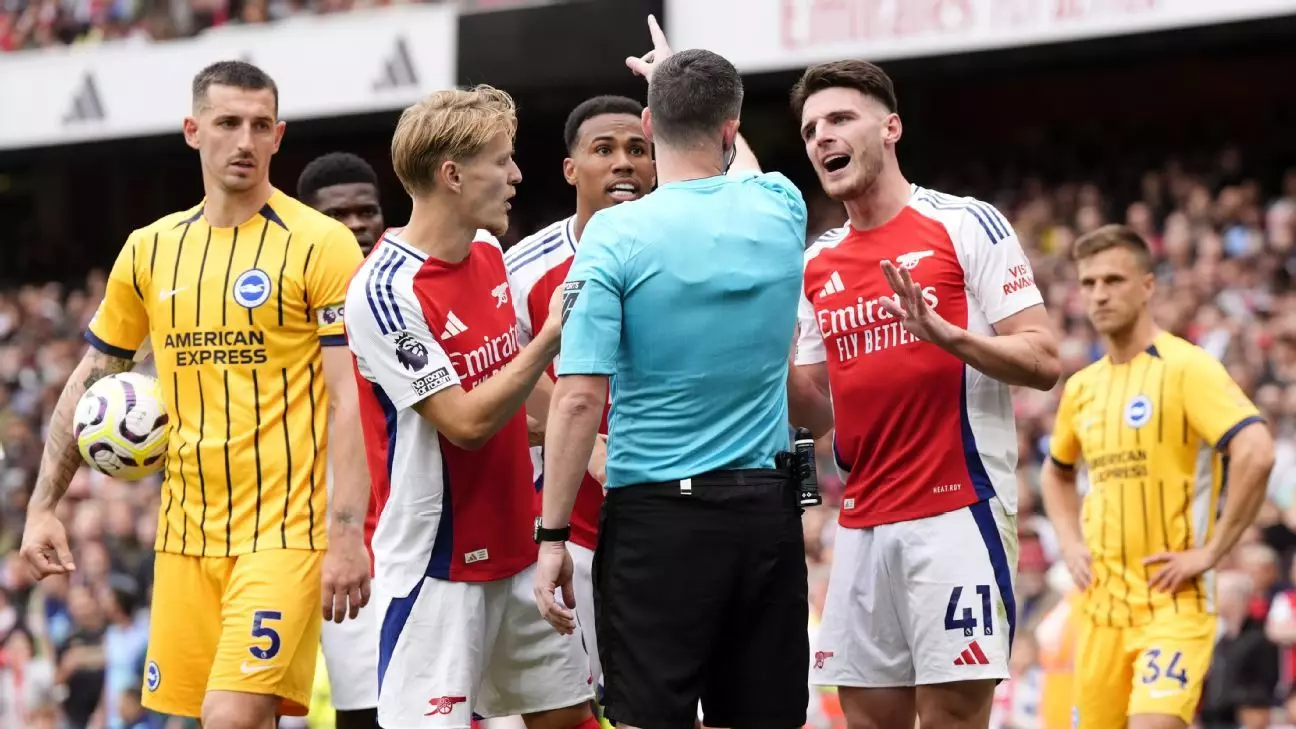Referees have an immensely challenging job on the football field, where split-second decisions can heavily influence the outcome of a match. The case of Chris Kavanagh and Declan Rice serves as a perfect testament to the intense scrutiny referees face. Kavanagh recently expressed his discomfort in issuing Rice a red card for a seemingly minor infraction—kicking the ball away after an opponent’s free-kick. During an analysis of this incident, Kavanagh revealed that he was bound by the laws of the game. Despite his personal reservations, he felt compelled to enforce the rules strictly, illustrating the delicate balance referees must maintain between their judgment and the regulations.
Maintaining authority while also being empathetic is a tough juggling act for any referee. With the audio from Kavanagh’s deliberations made public through the Premier League’s “Match Officials Mic’d Up” program, fans had a rare glimpse into the decision-making process that unfolds on the pitch. This transparency is crucial, as it not only illuminates the pressures referees endure but also demystifies the often-misunderstood nature of officiating.
The second yellow card issued to Declan Rice triggered surprise and discontent, particularly from Arsenal’s manager, Mikel Arteta, who voiced his absolute astonishment that Rice was penalized. In a sport rife with emotional highs and lows, the aftermath of such decisions can lead to passionate critiques from coaches, players, and fans alike. Arteta’s reaction speaks to the broader narrative surrounding officiating in elite football, highlighting the recurring theme of inconsistency that plagues refereeing decisions.
Kavanagh’s admission that he was “put in an awful position” emphasizes the psychological strain referees often face. The pressures of public perception and professional accountability can result in uncomfortable decisions. If players, like Rice, threaten to undermine the authority of referees, the consequences can have long-lasting impacts on the game’s integrity.
The Role of VAR: Boon or Bane?
As the governing body of referees, the PGMOL, led by Howard Webb, seeks to mitigate criticism by advocating for decisions rooted in fairness and adherence to the rules. Webb’s remarks on the Rice incident reinforced Kavanagh’s choice to act upon what he saw as a violation of the rulebook. The nuances of this conversation—as well as the alternative conclusions drawn by Webb regarding other incidents, such as Joao Pedro’s lack of punishment—illustrate the imperfect nature of real-time decision-making.
An equally pertinent matter is the use of VAR technology. Webb’s analysis of the contrasting calls made in the Everton-Brighton match further underscores the complexities involved. The overturning of a penalty indicative of a referee’s misjudgment, coupled with the unfortunate disallowance of a clear goal for Bournemouth due to a handball interpretation, highlights the fallibility present in any officiating system, regardless of technological aid.
A common thread in these discussions is the quest for consistency—a fundamental principle in creating a level playing field. Webb’s acknowledgment of missteps, whether it was the lack of a yellow card for Pedro or the overturned goal, signifies recognition of referees’ human limitations. However, the emphasis on pre-season messaging to players becomes crucial. Establishing clear guidelines helps players understand that minor infractions can lead to severe penalties.
The Premier League’s ongoing dialogue surrounding such contentious incidents is vital in fostering a mutual understanding between fans, players, and officials. The more transparency that exists in officiating, the more trust can be built among all stakeholders within the sport.
The realm of football officiating remains a complicated landscape filled with high stakes and even higher scrutiny. While technological advancements like VAR have introduced opportunities for correction, they also bring their own challenges. Ongoing discussions, such as those initiated by the “Match Officials Mic’d Up” series, are not merely about defending decisions; they serve to humanize referees and celebrate the difficult yet essential role they play in maintaining the integrity of the game. Understanding these complexities ultimately leads to a richer appreciation of football as a whole, navigating the fine line between rules and real-time execution. As we look to the future, a collective commitment to improvement across all levels of officiating may just be what the sport needs.

